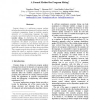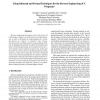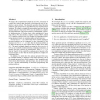578 search results - page 34 / 116 » Analysis of Programs with Exception-Handling Constructs |
ASWEC
2005
IEEE
14 years 2 months ago
2005
IEEE
Program slicing is a well-known program analysis technique that extracts the elements of a program related to a particular computation. Based on modular monadic semantics of a pro...
ICSM
1996
IEEE
14 years 27 days ago
1996
IEEE
Reverse engineering of program code is the process of constructing a higher level abstraction of an implementation in order to facilitate the understanding of a system that may be...
ICFP
2007
ACM
14 years 8 months ago
2007
ACM
We analyze the computational complexity of kCFA, a hierarchy of control flow analyses that determine which functions may be applied at a given call-site. This hierarchy specifies ...
PLDI
2009
ACM
14 years 9 months ago
2009
ACM
High-level languages are growing in popularity. However, decades of C software development have produced large libraries of fast, timetested, meritorious code that are impractical...
CGO
2008
IEEE
14 years 3 months ago
2008
IEEE
Liveness analysis is an important analysis in optimizing compilers. Liveness information is used in several optimizations and is mandatory during the code-generation phase. Two dr...



